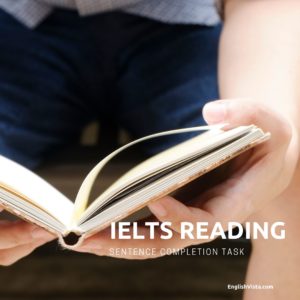
In the sentence completion task of the IELTS Reading test, you will be asked to complete sentences by using a word, short phrase or number from the text to fill gaps. In order to complete this task well, you need to be able to locate specific information, understand a short passage of text and choose the most appropriate word. Therefore, you will benefit from improving your paraphrasing skills, skimming and scanning skills and, most importantly, your reading comprehension (no doubt the MOST important skill to be successful in the IELTS Reading test).
Here are some top tips to ensure your success with this type of question in the IELTS test.
- Think about which type of word is required in the gap – is it a noun, an adjective or a verb?
- Check that the sentence is grammatically correct when the word is inserted!
- Consider the topic of the sentence and where that information is located in the passage.
- The answers to the questions will (normally!) come in order in the text. Use this to help you locate where in the text the answer may be located.
- Ensure that you double check whether the answer is asking for one word, two words or a number as the answer.
As with any part of the IELTS test, practice makes perfect. So be sure to use our Sentence Completion Practice Tasks to help develop your ability and skill. Check out our other reading practice tasks too!
Passage:
Emotion-detecting tech should be restricted by law
A leading research centre has called for new laws to restrict the use of emotion-detecting tech. The AI Now Institute says the field is “built on markedly shaky foundations”. Despite this, systems are on sale to help vet job seekers, test criminal suspects for signs of deception, and set insurance prices. It wants such software to be banned from use in important decisions that affect people’s lives and/or determine their access to opportunities.
The US-based body has found support in the UK from the founder of a company developing its own emotional-response technologies – but it cautioned that any restrictions would need to be nuanced enough not to hamper all work being done in the area.
AI Now refers to the technology by its formal name, affect recognition, in its annual report. It says the sector is undergoing a period of significant growth and could already be worth as much as $20bn (£15.3bn). “It claims to read, if you will, our inner-emotional states by interpreting the micro-expressions on our face, the tone of our voice or even the way that we walk,” explained co-founder Prof Kate Crawford.
Text adapted from: https://www.bbc.com/news/technology-50761116
Questions:
Choose no more than two words from the passage to complete the following sentences.
- Experts in AI have requested ___________________ to control how emotion-detecting technology is able to be used.
- Such experts believe that using this technology to influence vital judgements should be _____________ .
- However, supporters warn that _______________ must be carefully considered to ensure they do not negatively affect the progress being made with this type of technology.
- The full name of the technology is _____________________.
- The technology is capable of recognising people’s feelings through carefully reading their facial _______________________.
Answers:
- new laws
- banned
- restrictions
- affect recognition
- micro-expressions
New Vocabulary to Learn!
restrictions = limit or control something or someone
micro–expressions = facial expressions that occur within a fraction of a second and may be voluntary or involuntary
facial = of the face
capable = having the ability to do something, able to
influence = affect the behaviour of someone or something
vital = important
judgements = decisions
markedly = something that is significant or clearly noticeable
vet = to carefully examine something or someone
deception = to deceive someone; to mislead them or hide the truth
nuanced = something that is done with extreme care
hamper = to hinder something and affect the progress of something
